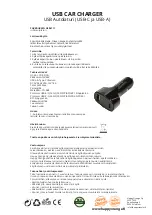
CONTINUED
Your front airbags are dual-stage
airbags. This means they have two
inflation stages that can be ignited
sequentially or simultaneously,
depending on crash severity.
In a
crash, both stages
will ignite simultaneously to provide
the quickest and greatest protection.
In a
crash, one stage will
ignite first, then the second stage
will ignite a split second later. This
provides longer airbag inflation time
with a little less force.
Your front airbags are also dual-
threshold airbags. Airbags with this
feature have two deployment
thresholds that depend on whether
or not the occupant is wearing a seat
belt.
If the occupant’s belt is
,
the airbag will deploy at the same
threshold as a conventional airbag,
because the occupant would need
extra protection.
If the occupant’s belt
, the
airbag will inflate at a slightly higher
threshold, when the airbag would be
needed to supplement the protection
provided by the seat belt.
Your front airbags are also advanced
airbags. The main purpose of this
feature is to prevent airbag-caused
injuries to short drivers and children
who ride in front.
For the advanced airbags to work
properly, occupants must sit upright
and wear their seat belts properly. If
a child seat is installed in the front, it
must be properly secured.
In addition, do not spill any liquids on
or under the seats, cover the sensors,
or put any cargo or metal objects
under the front seats. Ask second
row passengers to not put their feet
under the front seats. Any of these
actions could damage the sensors or
prevent them from working properly.
Failure to follow these instructions
could damage the sensors or prevent
them from working properly.
Additional Information About Your Airbags
Driver and Passenger Saf ety
Dual-Stage Airbags
more severe
less severe
Dual-Threshold Airbags
not latched
is latched
Advanced Airbags
25
















































